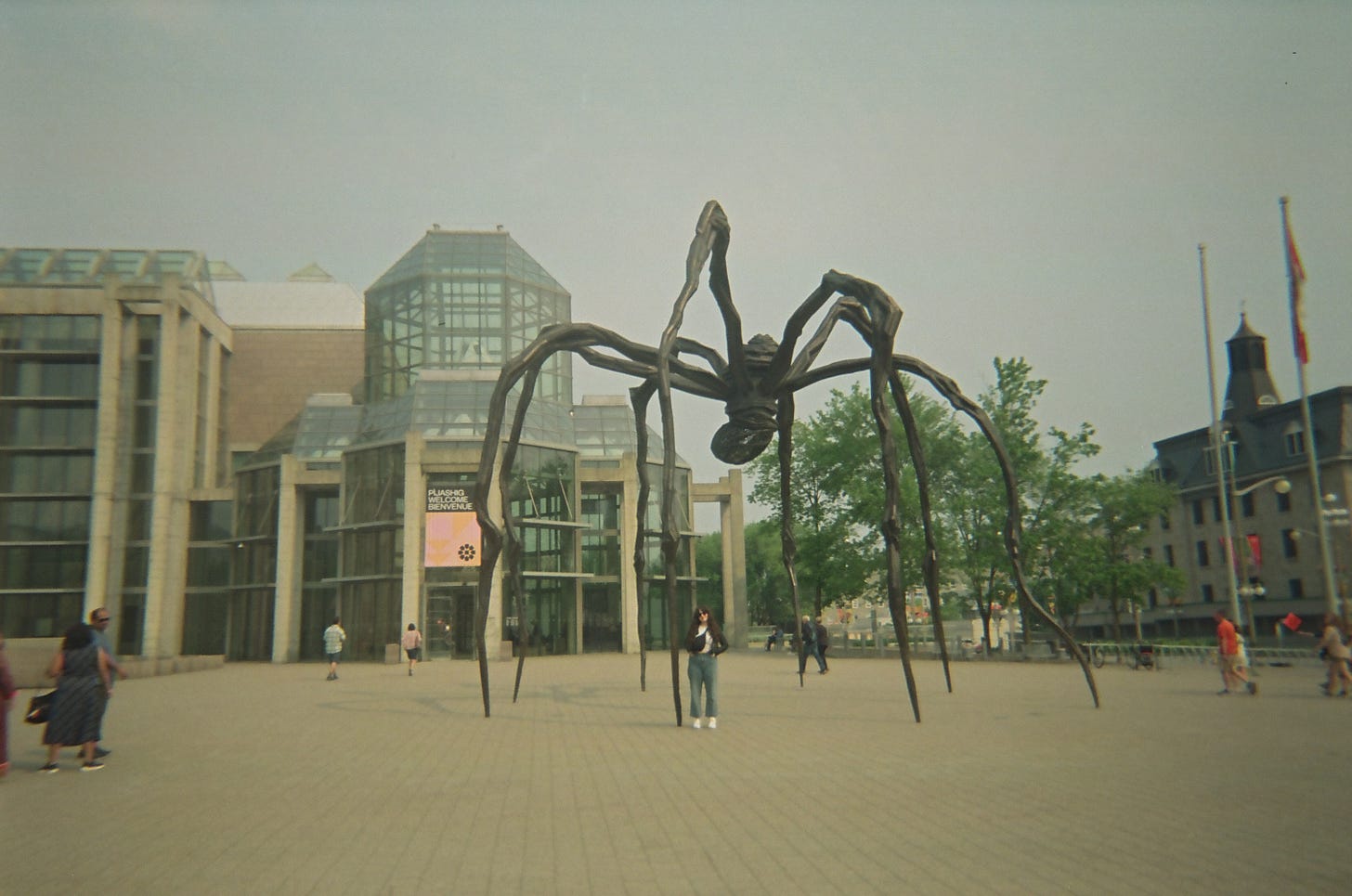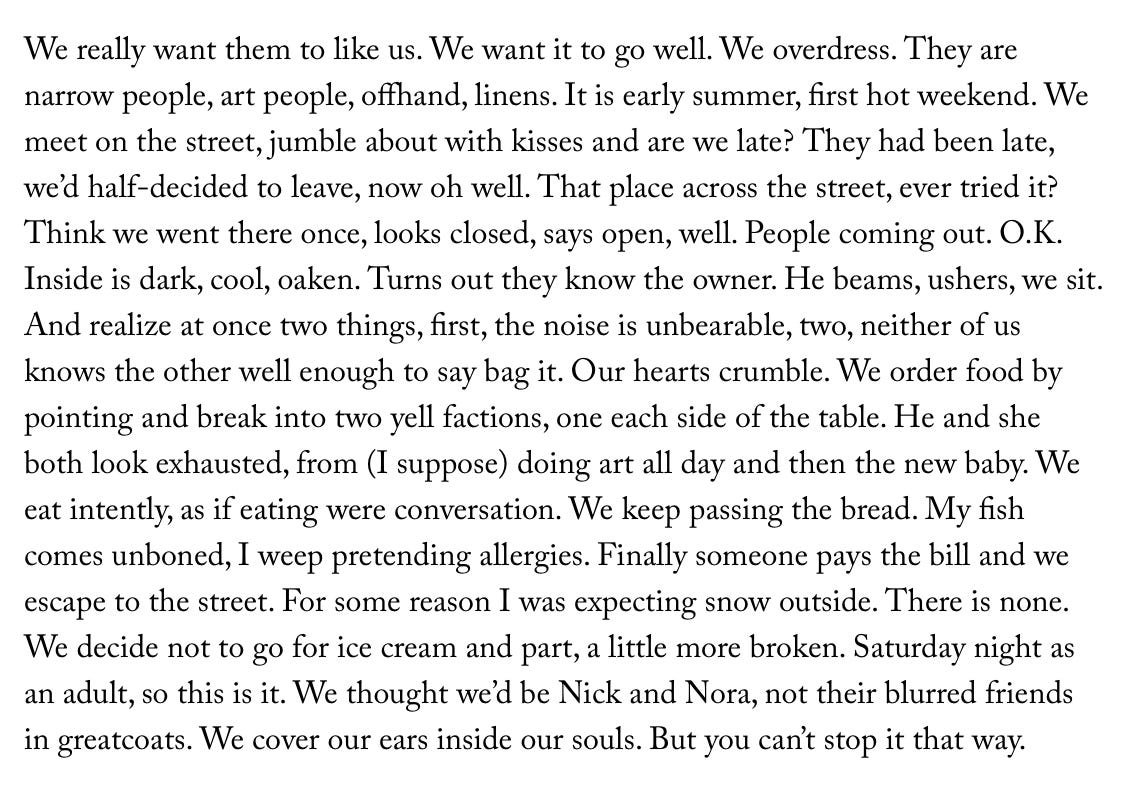There's Nothing to Do but Salute It From the Shore
Will it always feel like this?
The Sunday Letter #17
This weekend, I had brunch with a friend I’ve known since we were first-year undergraduate students, lost and alone in a summer political studies class. We first met when it was unreasonably hot and smokey outside, much like it’s been again lately.
These days, my conversations with friends are veering into increasingly existential territory as we all marvel at how quickly we ascended the ranks into adulthood, an increasingly dubious concept to me. We talk about buying houses, about “settling” “down,” about in-laws and weddings and how we blinked and suddenly here we were, making real choices. How do you know which way is the right way? Will it always feel like this, exciting and terrifying all the same?
As I get older, the Sylvia Plath fig tree analogy often comes to mind.
I saw my life branching out before me like the green fig tree in the story. From the tip of every branch, like a fat purple fig, a wonderful future beckoned and winked. One fig was a husband and a happy home and children, and another fig was a famous poet and another fig was a brilliant professor, and another fig was Ee Gee, the amazing editor, and another fig was Europe and Africa and South America, and another fig was Constantin and Socrates and Attila and a pack of other lovers with queer names and offbeat professions, and another fig was an Olympic lady crew champion, and beyond and above these figs were many more figs I couldn't quite make out. I saw myself sitting in the crotch of this fig tree, starving to death, just because I couldn't make up my mind which of the figs I would choose. I wanted each and every one of them, but choosing one meant losing all the rest, and, as I sat there, unable to decide, the figs began to wrinkle and go black, and, one by one, they plopped to the ground at my feet.
“Is this just how all women have always felt?” I asked my friend.
“I think so,” she said.
Re: the mother/daughter continuum: is anyone looking into this??
To close off, here’s Cheryl Strayed in The Rumpus’ Dear Sugar column reminding us that when it comes to making a choice between two life paths, “there will likely be no clarity, at least at the outset; there will only be the choice you make and the sure knowledge that either one will contain some loss”:
And yet, there remains my sister life. All the other things I could have done instead. I wouldn’t know what I couldn’t know until I became a mom, and so I’m certain there are things I don’t know because I can’t know because I did. …I’ll never know and neither will you of the life you don’t choose. We’ll only know that whatever that sister life was, it was important and beautiful and not ours. It was the ghost ship that didn’t carry us. There’s nothing to do but salute it from the shore.

This week’s recommendations
In online news, Paul Schrader took to Facebook this week to say that Asteroid City is “The most Wes Anderson film Wes Anderson has made. And for that reason the best. He has distilled his design-driven anti-empathy film style to its essense.” This review apparently upset some people, even though Schrader wrote Taxi Driver and First Reformed and therefore knows a thing or two about anti-empathy (I say this as someone who adored First Reformed but probably could not stand to ever, ever rewatch it lest I want to be made severely depressed again). But he’s kind of right! Anderson’s style is often reductively considered “twee” (derogatory) but is in fact purposefully very distant, painfully aware of its own artifice.
A few people on Twitter mentioned that The Life Aquatic with Steve Zissou (2004) was their favourite Anderson film, so I watched that one before Asteroid City, which just came out. Life Aquatic has unexpectedly really stuck with me, even though it’s basically Moby Dick for men who wear hats like this:
But it turns out a story about a man who throws his life away carelessly seeking revenge against a killer animal, only to encounter it in awe and gratitude by the story’s end, having lost everything to his own hubris, can be kind of emotionally devastating? (I don’t know, I haven’t read Moby Dick). I loved this film. Here’s the end, if you don’t mind spoilers or Sigur Rós:
Plus, Anjelica Huston reprises her Tenenbaums-character as an emotionally disaffected woman who is fought over by multiple men who just want to be better for her. No notes!
As others have said, you will either love or hate Asteroid City, which plays on multiple levels of artifice and meta references, including to other Anderson films. And was it just me, or did it have a Waiting for Guffman play-within-a-play vibe too?
Asteroid City has all the usual Anderson hits: there are dysfunctional families, precocious children, horrendously blunt conversations around death, and wonderful, inconclusive reflections on the unknowability of the meaning of art, life, and love. One of Anderson’s most visually precise films yet, and self-referential on how aesthetic constraints can be stifling in their own way (Bryan Cranston’s character is a nod to this). Sofia Coppola’s cousin Jason Schwartzman is particularly affecting, as are Scarlett Johansson and Margot Robbie (who has one scene and devastates with it).
Given the choice, though, I’d still say that The Royal Tenenbaums remains my favourite of Anderson’s oeuvres (so far). I haven’t seen The Darjeeling Limited, Rushmore, or Bottle Rocket, which I’ve seen others say are also fantastic. Do you have a favourite Wes Anderson film I need to watch next? Let me know!
Finally, I also watched BlackBerry (Matt Johnson, 2023), which was very much a Boy Movies-coded, wannabe Canadian Social Network. Glenn Howerton (aka Dennis from It’s Always Sunny in Philadelphia) and Jay Baruchel star in this biopic about the highs and lows of being a software company in the early 00’s in Waterloo, Ontario. This was a middle-of-the-road watch for me. Fun enough performances, though distracting casting (I could never tell how old anyone was supposed to be), and wacky pacing. The years kept jumping ahead, but we never saw much of the world outside of their offices. And since the characters don’t exist outside of work, they exist in stasis with no discernible personalities beyond their archetypes. It is encouraging, nonetheless, to see average Canadian talent on the big screen, and I mean that in a very loving way!
*
More Caroline Calloway news: she finally finished her book and apparently it’s kind of good? (Sidenote: I’m fascinated by the idea, posited by the Post reviewer, of being forever aligned with one’s nemesis. Seems exhausting, tbh!)
My anxiety was not assuaged when she referred to me as “my queen” and inserted a flutter of butterfly emoji in her responses to my increasingly frantic emails about an advance copy. Reading her replies, I was tempted to marvel at the extent to which she is irrepressibly herself, but I knew there was nothing irrepressible about the whole performance. It takes effort and gumption to be so exactly and so extravagantly who one is.
Queen of online controversy Agnes Callard is back with another hot take, this time that she finds people who enjoy travelling insufferable. Quelle surprise! I’m mostly linking to this article so I can share the following tweet:

A gorgeous quote from actor Mark Rylance on grief and what comes after: “I feel hollowed out by loss but I don’t feel the need to refill that hollow place…empty spaces can be good.”
Speaking of Waiting for Guffman, here’s the wonderful Parker Posey on menopause:
Every little girl and grown woman you ever were, they all come out to play. I call it the perimenopausal puppet troupe. It’s a beautiful hello–good-bye of several years. But it does a number on your body, and it’s very confusing. Waking up and sweating in your glasses and not being able to see out of them and having to work… My body was an alien.
Jane Fonda on death and motherhood: “I was not the kind of mother that I wished that I had been to my children.”
Tim Robinson and the Golden Age of Cringe Comedy, which begins with a surreal scene involving Robinson and spicy food: “When a Tim Robinson character cries, it is a result of an epic struggle for selfhood.”
A 2017 short story from Anne Carson that had Twitter up in arms a few weeks ago, called Saturday Night as an Adult:










This newsletter so perfectly sums up the conversations I've been having with friends lately. Suddenly we're all in our mid to late-twenties and our heads are spinning.
I didn’t know Ottawa had the same spider as Bilbao in Spain.